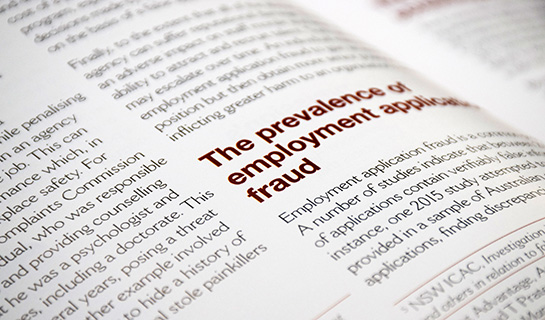Corruption Matters - May 2018 | Issue 51
Resumé checks: no time for complacency says ICAC report
Employment application fraud is a form of corrupt conduct. And, given that between 20% and 30% of job applications contain falsehoods, it is also widespread conduct. The ICAC released a new report earlier this year on better employment screening practices to help public sector agencies detect false resumés and prevent corruption.

It can be claiming a false qualification, adding an incorrect employment history or false reference, or even creating a false identity; whichever the case may be, it is employment application fraud, and it can undermine the integrity of the public sector and impair public confidence in public administration.
Unfortunately, it is relatively common for people who submit false resumés to engage in further corruption once they are employed. The ICAC has published numerous investigation reports showing that conduct – such as procurement fraud or making corrupt payments – was perpetrated by a public official whose original resumé was false. Released in February 2018, the ICAC’s report, Strengthening employment screening practices in the NSW public sector, provides guidance on how to:
- apply risk-based employment screening
- assign appropriate roles and responsibilities for employment screening
- manage challenges associated with screening non-permanent workers
- improve the quality of specific employment screening checks
- perform post-employment screening.
Findings of the report are based on survey responses from NSW state and local government organisations and the outcomes of a series of interviews and focus groups (from both inside and outside the NSW public sector) with HR, risk and employment screening professionals.
The report provides practical advice, such as the five tips provided below.
Evaluate the basis of your employment-screening framework
Better practice agencies employ a risk-based approach. The amount of screening that an employee receives is commensurate with the risks associated with the role.
By formally using a risk-based approach this can help reduce the likelihood that employees are underscreened or excessively screened. In addition, a risk-based approach provides a clear justification for the types of checks that are performed, and can indicate when further screening may be required.
Ensure non-permanent staff are not overlooked
Often contingent hires do not receive quality employment screening because this function is under the control of procurement, checks are poorly specified and the tenure of contingent hires is poorly controlled. To address this problem, the ICAC advises that human resource staff should be responsible for the engagement of contingent hires.
Given that there are very low barriers of entry for contingent labour hire suppliers to get on the prequalified panel, it is important that agencies perform their own due diligence on suppliers, clearly communicate the quality of checks needed and verify that the supplier performs the checks to the right standard.
Check qualifications by contacting the issuing institution
Many agencies use poor quality methods of verification, such as relying on photocopies of qualifications or inspecting documents, which could be fake.
Complete disciplinary investigations and provide frank advice to future employers performing checks
All too often, agencies allow employees to resign without conducting a proper investigation, recording findings in their personnel file or sharing this information. This means that the next employer is unaware of serious employment issues, which can result in the employee repeating the misconduct.
Rescreen employees throughout their tenure
Post-employment screening is particularly important when an employee experiences substantial changes in their role such as a promotion or a change in their personal circumstances. Many employers rely on employees to declare such changes without any rescreening.
This strategy is limited, as some employees may seek to keep their recent driving offences, criminal record or drug addiction a secret due to embarrassment or a fear that it may adversely affect their employment.
When implementing post-employment screening it is important to engage key stakeholders, obtain informed consent and use a risk-based approach to inform what should be rescreened.
